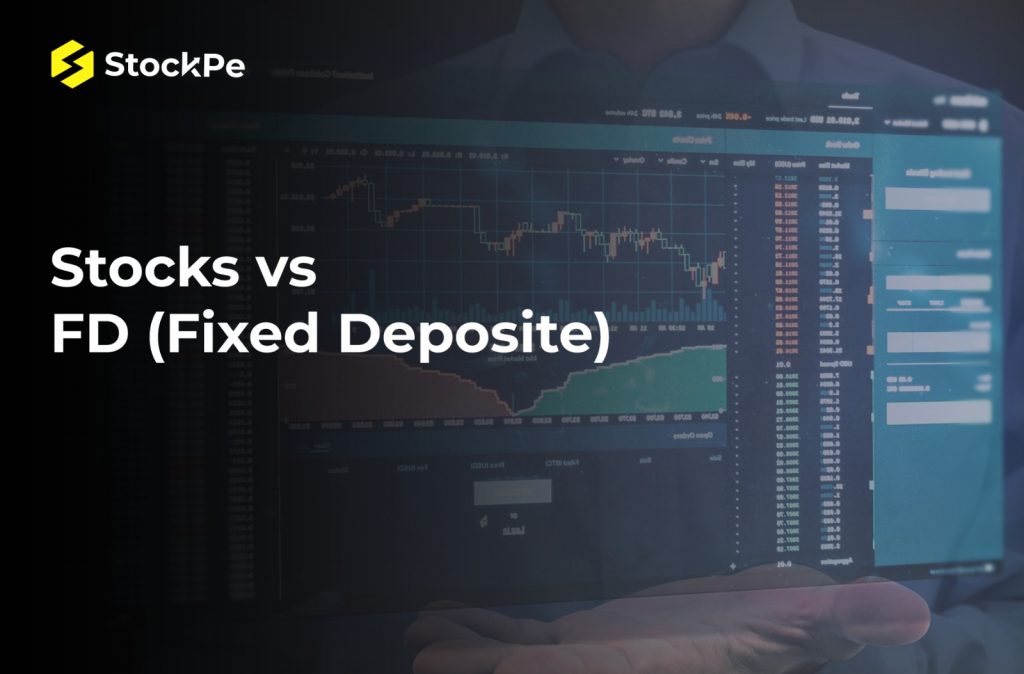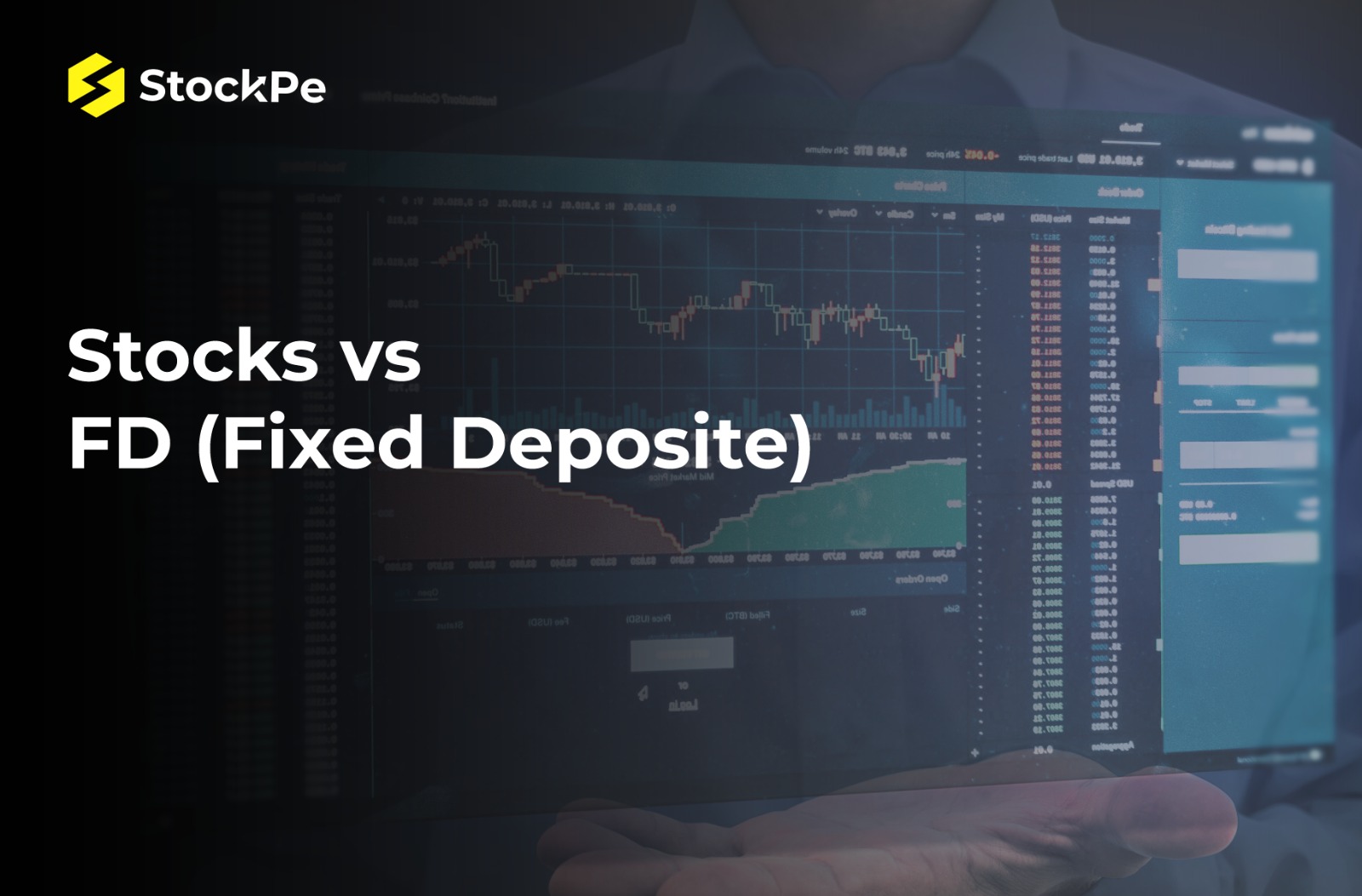It is absolutely necessary to generate a fixed income on a regular basis. However, simply depending on your savings is not the smartest path to follow. Investments are the pillars of financial security and there are a plethora of investment options out there for everyone regardless of their levels of expertise, capital, and competency.
Are you a safe player with a knack for savings and wish to consider fixed deposits as an option? Or are you an adventurous risk-taker exploring the road to stock investment? As these two are the most popular and significant investment options, the FD vs Stocks comparison becomes very essential for any investor. In this blog, we underline the key differences between fixed deposits and stocks, along with both their pros and cons and what might suit you better. Let’s get right in!

What are Fixed Deposits?
It is an investment option wherein the investor deposits a lump sum amount into their bank account, Non-Banking Financial Companies (like Bajaj Finance, Muthoot Finance, etc), or any other financial institution for a fixed period. With FDs, you:
- Can profit from the compound interest after its maturity
- Enjoy fixed rates of interest and tenure
- Get risk-free assured returns.
FD Market Size
As per Boston Consulting Group’s (BCG) report ‘Future of Fintech July 2022’, the huge market of fixed deposit (FD) still has the biggest share (18%) in India’s overall financial wealth.
FD Market Trends
| Bank Name | On Amount Under ₹ 1 crore | On Amount Over ₹ 1 crore |
| Regular (% p.a.) | Regular (% p.a.) | |
| SBI | 6.25 | 4.25 |
| ICICI Bank | 6.50 | 6.45 |
| HDFC Bank | 6.00 | 4.85 |
| Axis Bank | 6.25 | 6.00 |
| PNB | 6.25 | 4.50 |
Pros of Fixed Deposits
- Low Risk
Being one of the most risk-free options, the interest rates-based returns of FDs are not impacted by market volatility. Therefore, thanks to zero price fluctuation, your funds grow at a steady pace.
- Assurance
Due to the predetermined tenure period, FD becomes a locked asset and guarantees returns to you.
Cons of Fixed Deposits
- Taxable
Despite its tax benefits, you don’t entirely save taxes through FDs since your post-maturity returns are largely taxable and you don’t receive complete benefits.
- Nullification due to Inflation
During the economic environment of rapid inflation, returns from an FD often become virtually negligible. Due to this nullification of FD-based returns caused by higher rates of inflation, it is advised to grow your money above the inflation rate.
- Low Liquidity
Usually having a lock-in period of 5 years, FDs do not allow loans against them. This takes away the investor’s flexibility. Moreover, the option of premature withdrawal is offered by a few banks, and that too at a penalty rate of 0.5% to 1%.
- Lower Returns
When compared to options like stock investments, FDs offer mediocre returns. The following table depicts the average FD interest rate over the last decade:
| Year | Average Fixed Deposit Interest Rate (% p.a.) |
| 2022 | 5.05-5.35 |
| 2021 | 5.25-5.35 |
| 2020 | 5.70-6.40 |
| 2019 | 6.25-7.25 |
| 2018 | 6.25-6.70 |
| 2017 | 6.50-6.90 |
| 2016 | 7.00-7.50 |
| 2015 | 8.50-8.75 |
| 2014 | 8.75-9.10 |
| 2013 | 8.75-9.00 |
Let’s move to the other investment route in the FD vs Stocks argument.
What are Stock Investments?
A stock (or equity) investment refers to when you invest in a company and get certain ownership of it. Investing in the stock market can be done:
- Directly with the help of online stock brokers.
- Through a mutual funds company that has its own pool of assets to sell on a regular basis and redeem its shares.
Stock Market Size
In spite of equity mutual funds having a compound annual growth rate (CAGR) of 39% in the previously mentioned BCG report, India’s market capitalization has reduced by $3.1 trillion according to Business Standard. This massive $231 billion depreciation had been for the most part due to the plunge in Adani Group’s stocks following the Hindenburg report.
Stock Market Trends
The following customized table depicts the trend of massive increments in stock market size over the last decade:
Pros of Stock Investments
- High liquidity
FDs cannot be easily converted into cash. But you can quickly convert your stocks into cash by selling them using your online stock trading account. This money is soon credited into your bank account, making it a better option in the FD vs Stocks battle in terms of liquidity.
- Beats Inflation
Since most companies invest in assets through money borrowed from public and/or private investors, they generate higher returns, thus beating inflation. As stock investments move along with the market flow, they are resilient to the conditions of inflation.
- Lock-In Period
Thanks to the lock-in period in stock trading, investors are stuck to long-term investing and end up generating maximum profits. Moreover, this lock-in period is crucial to limit the companies from soaring valuations in their IPOs and to restrict anchor investors from easily escaping just under one month of stock listing.
- Better Returns
In contrast to the average returns of nearly 7% from FDs, you can enjoy higher interest rates of 14-16% from long-term stock investments. Given the slow pace of FDs, who would not prioritize stock-based better returns? Look at the following term and notice the ever-growing average return rates from stock investments in the last 10 years:
| Year | Average Return (in % p.a.) |
| 2013 | -8.10 |
| 2014 | 8.11 |
| 2015 | 13.20 |
| 2016 | 11.09 |
| 2017 | 5.56 |
| 2018 | 6.75 |
| 2019 | -7.94 |
| 2020 | 31.26 |
| 2021 | 21.50 |
| 2022 | 22.20 |
Cons of Stock Investments
- Risk
In the FD vs Stocks argument in terms of risk factors, the former is clearly the winner. Even though it has more lucrative rewards, stocks are a high-risk option. If you go all in without proper funds management and a strategically-planned approach, you might even end up losing your entire investment. So, if you are an individual who is extremely opposed to risk, you must avoid stock investments altogether.
- Tax
Another disadvantage of stock investments is the long-term as well as short-term capital gains tax levied on stock trading and other major transactions.
Which is a better option for you?
Finding a high-yielding yet safe investment tool is quite challenging. However, the right option for you depends on factors such as:
- Your appetite for risk
- The size of your capital
- How much of your time and effort do you wish to invest
- The security of your investments
On one hand, fixed deposits offer you assured, albeit low-yielding, returns. While on the other hand, stock returns are directly related to market mood and trends. Become a smart, intuitive, and strategic player to reap benefits from this FD vs Stocks debate by investing wisely in both of them.
We hope that this blog gives you a certain clarity over these two prominent investment options.
FAQs
1. What is a Recurring Deposit?
Offering similar interest rates like FDs, Recurring Deposit refers to depositing money in a fixed account at a monthly time period.
2. How is a Savings account different from FD?
You can create a savings account in a bank to get an interest rate of just 3-4%. Unlike FDs, you can perform transactions on your savings account as per your wish.
3. How to choose between FD and Stocks?
In the FD vs Stocks, you can choose the former for a stable, safer, and gradual income channel while the latter for risk-involved yet highly lucrative returns.





